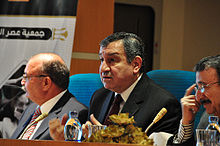- Essam Sharaf
-
Essam Sharaf
عصام شرف
Prime Minister of Egypt Incumbent Assumed office
3 March 2011President Mohamed Hussein Tantawi (Acting) Deputy Yehia El-Gamal Preceded by Ahmed Shafik Minister of Transportation In office
1 June 2004 – 15 December 2005Prime Minister Ahmed Nazif Preceded by Hamdy El-Shayeb Succeeded by Mohamed Mansour Personal details Born February 1952 (age 59)
Giza, EgyptPolitical party Independent (2005–present) Other political
affiliationsNational Democratic Party (Before 2005) Alma mater Cairo University
Purdue UniversityProfession Civil engineer Religion Sunni Islam Essam Abdel-Aziz Sharaf (Arabic: عصام عبد العزيز شرف, IPA: [ʕeˈsˤɑːm ʕæbdelʕæˈziːz ʃɑɾˤɑf]; born 1952) is an Egyptian academic and politician who has been Prime Minister of Egypt since March 3, 2011; previously he was Minister of Transportation from 2004 to 2005.
Contents
Early life and education
Sharaf was born in the Egyptian city of Giza in 1952.[1] After receiving his B.Sc. in civil engineering from Cairo University in 1975, he went to Purdue University where he continued his studies, receiving his M.Sc. Engg in 1980 and his Ph.D. in 1984.[2]
Political and academic career
Sharaf took a post as a visiting assistant professor at Purdue in 1984 before becoming assistant professor of Highway and Traffic Engineering at the University of Cairo the following year. In 1990, he was an assistant professor in Civil Engineering at King Saud University in Saudi Arabia. He returned to the University of Cairo in 1991, becoming a professor of Highway Engineering in 1996 while working as senior advisor for the Transportation & Aviation department in Zuhair Fayez Partnership (ZFP) in Jeddah, Saudi Arabia. Sharaf was the senior adviser to the Egyptian Minister of Transport in 1999 and the Senior Technical Adviser to the municipality of Al Ain in the UAE in 2003.[2]
He served as Egyptian Minister of Transportation from July 13, 2004 to December 31, 2005. He resigned due to differences that cropped up between him and Prime Minister Ahmed Nazif. Nazif decided to put the Egypt Engineers Association under state control, a move that meant confiscation of union funds and property by the government.[3][4][5] Sharaf later claimed that these events led to the Qalyoub rail accident in 2006.
Following his resignation, Sharaf returned to academia, accepting a post at Cairo University, where he remained a vocal critic of the Mubarak regime, particularly with respect to its handling of Egypt's public transportation infrastructure.[6] During this time he also served as an advisor to Dubai's Roads and Transport Authority, and established the Egypt Scientific Society together with Mohamed ElBaradei, Ahmed Zewail and other Egyptian scientists.
2011 events
Sharaf was present and active at the Tahrir square protests during the 2011 Revolution, which endeared him to the leaders of the democracy movement and led them to suggest his name to the Military Council as a possible replacement for Prime Minister Ahmed Shafik.[7]
He was asked by Egypt's governing military council to form a government on 3 March 2011, following Shafik's resignation.[8][9] On 4 March, he addressed crowds of pro-democracy activists at Tahrir Square shortly after Friday prayers, an unusual move for an Egyptian politician.[10] Sharaf appeared on stage with Mohamed Beltagy, a Muslim Brotherhood leader. In his speech he said "I draw my legitimacy from you" and reiterated his commitment to democratic transition, but pleaded for patience. It is noted that he is the first Egyptian prime minister to give a monthly State-of-the-Union address (since Aziz Sedki 1972-1973).[10] Following further unrest leading up to Parliamentary elections in November 2011, Sharaf resigned and ceded full power to the Supreme Council of Armed Forces on November 21, 2011.
Political views
Sharaf is noted for strongly opposing normalization of ties with Israel. He considers the resolution of the Israeli–Palestinian conflict to be a prerequisite to cooperation between the two states.[1]
Awards
- The State Encouragemental Prize in Engineering Sciences from the Academy of Scientific Research and Technology in 1987 and 1997
- First Class Medal of Excellence from the President of Egypt Hosni Mubarak in 1995 [2]
- Cairo University Incentive Award for Scientific Excellence in Engineering in 1997
- Egyptian State Prize in Engineering Sciences, 1997
- Excellence Award in Engineering from Purdue University, America in 2005 [2]
- Man of the Year Award (Rafiq Hariri Award), Beirut in 2006
- Fellow of the Chartered Institute of Logistics and Transport in the UK in 2007
- Certificate of Merit from the Cairo University in the Celebration of Scientists Day in 1988 and 1998 [2]
References
- ^ a b "Meet Essam Sharaf: Egypt's first post-revolution Prime Minister". Ahram online. http://english.ahram.org.eg/~/NewsContent/1/64/6892/Egypt/Politics-/Meet-Essam-Sharaf-Egypts-first-postrevolution-Prim.aspx. Retrieved 4 March 2011.
- ^ a b c d e "Purdue University Profile of Essam Sharaf". https://engineering.purdue.edu/Engr/People/Awards/Institutional/DEA/DEA_2006/sharaf. Retrieved 3 March 2011.
- ^ "Essam Sharaf's biography". 6 March 2011. http://assafir.com/Article.aspx?EditionId=1788&ChannelId=42000&ArticleId=502&Author=. Retrieved 6 March 2011. (in Arabic)
- ^ "Factbox: Essam Sharaf chosen as Egypt's new prime minister". Reuters. 3 March 2011. http://www.reuters.com/article/2011/03/03/us-egypt-sharaf-idUSTRE7222KE20110303. Retrieved 3 March 2011.
- ^ "Egypt's prime minister resigns". Al-Jazeera English. 3 March 2011. http://english.aljazeera.net/news/middleeast/2011/03/20113393825273567.html. Retrieved 3 March 2011.
- ^ "Essam Sharaf appointed Egypt's new PM". Ahram on-line. 3 March 2011. http://english.ahram.org.eg/NewsContent/1/64/6859/Egypt/Politics-/Essam-Sharaf-appointed-Egypts-new-PM.aspx. Retrieved 3 March 2011.
- ^ "Egypte: le Premier ministre remplacé, satisfaction des opposants" (in French). Euronews. 3 March 2011. http://fr.euronews.net/depeches/772863-egypte-demission-du-premier-ministre-ahmad-chafic/. Retrieved 3 March 2011.
- ^ "Egypt's prime minister Ahmed Shafiq resigns". BBC News. 3 March 2011. http://www.bbc.co.uk/news/world-middle-east-12634117. Retrieved 3 March 2011.
- ^ "Bowing to opposition, Egypt premier resigns". The New York Times. 3 March 2011. http://www.nytimes.com/2011/03/04/world/middleeast/04egypt.html. Retrieved 3 March 2011.
- ^ a b "New Egypt PM addresses crowds in Tahrir Square". Hindustan Times. 4 March 2011. http://www.hindustantimes.com/New-PM-addresses-crowds-in-Tahrir-Square/Article1-669481.aspx. Retrieved 4 March 2011.
External links
- Meet Essam Sharaf: Egypt's first post-revolution Prime Minister, Ahmed Elieba and Marwa Hussein, 3 March 2011
- Profile: Egyptian Prime Minister Essam Sharaf, BBC News, 7 March 2011
- Sharaf - the post revolution Minister, Ikhwanweb, 4 March 2011
- Essam Sharaf, Egypt's new prime minister, rouses Tahrir Square crowds, Mark Tran, The Guardian, 4 March 2011
Political offices Preceded by
Ahmed ShafikPrime Minister of Egypt
2011–presentIncumbent Cabinet of Essam Sharaf OfficeNameTermOfficeNameTermVice Prime Minister Yehia El-Gamal (resigned) Ali El-Selmy (incumbent) 2011 Ministry of Interior Mansour el-Essawy 2011 Minister of Agriculture and Land Reclamation Ayman Farid Abu-Hadid 2011 Ministry of Justice Mohamed Abdel Aziz Ibrahim El-Gendy 2011 Minister of State for Antiquities Affairs Zahi Hawass† 2011-March 2011 Ministry of State for Local Development Mohsen El-Nomani Mohamed Hafez† 2006 Ministry of Civil Aviation Ibrahim Manna 2011 Ministry of Manpower and Migration Ahmed Hassan El-Boraei Ahmed Al-Boraei† 2005 Ministry of Communications and Information Technology Magued Osman 2011 Ministry of State for Military Production Sayed Meshaal 2011 Ministry of Culture Emad Badr El-Din Mahmoud Abu Ghazy 2011 Ministry of Petroleum and Metallurgical Wealth Mohamed Abdalla Mohamed Abdel Menim Ghorab† 1999 Ministry of Education and Higher Education Ahmed Gamal Eddin Moussa 2011 Ministry of Planning and International Cooperation Faiza Abu Naga 2011 Ministry of Electricity and Energy Hassan Younes 2011 Ministry of Religious Endowment (Awkaf) Abd Alla Al-Husseni Ahmed Helal 2011 Ministry of State for the Environment Affairs Maged George† 2004 Ministry of Scientific Research, Science and Technology Amr Ezzat Salama 2011 Ministry of Finance Samir Radwan 2011 Ministry of Social Solidarity and Justice Gouda Abdel Khalek† 2005 Ministry of Foreign Affairs Mohamed Kamel Amr 2011 Ministry of Tourism Mounir Fakhry Abdel Nour 2011 Ministry of Health and Population Ashraf Hatem 2011 Ministry of Trade and Industry Samir El-Sayiad 2011 Ministry of Housing, Utilities and Urban Development Mohamed Fathy El-Baradei 2011 Ministry of Transportation Atef Abdel Hamid Moustafa 2011 () Ministry of Water Resources and Irrigation Hussien Ehsan Al-Atfy 2011 Governor - Central Bank of Egypt Farouk Abd El Baky El Okdah 2011 Minister without portfolio; GID Chief Murad Muwafi 2011 Chairman of the Suez Canal Authority Ahmed Ali Fadel† 1996 Permanent Representative to the United Nations Maged A. Abdelaziz 2011 †Remained from previous administration. Below solid line: Granted Cabinet-level rank although not automatically part of the Cabinet.Prime Ministers of Egypt (List) Khedivate
(1878–1914)Sultanate
(1914–1922)Kingdom
(1922–1953)Republic
(1953–1958)U.A.R.
(1958–1971)Arab Republic
(1971–present)Italics indicate interim officeholder.
* military. † Beginning during Raghib's term, Orabi* headed a government in rebellion, July–September 1882.2011 Egyptian revolution and post-Mubarak transition Part of the Arab SpringTimeline Anti-Mubarak protestsDeath Toll • Resignation of Hosni MubarakTrials and judicial hearings • Human rights in Egypt under the SCAF • Reform process (Constitutional review committee • Constitutional referendum) • Maspero demonstrations • November 2011 Tahrir clashesReactions Domestic • InternationalPlaces Tahrir Square • Sidi BishrTransitional
governmentArmed ForcesMohamed Hussein Tantawi (Chairman) • Sami Hafez Anan • Mohab Mamish • Reda Mahmoud Hafez Mohamed • Abd El Aziz Seif-EldeenCabinetEssam Sharaf (Prime Minister) • Nabil el-Araby (Foreign Minister)Ousted
governmentPresidencyHosni Mubarak (President) • Omar Suleiman (Vice President)CabinetAhmed Nazif (Prime Minister) • Ahmed Shafik (Prime Minister) • Ahmed Aboul Gheit (Foreign Minister) • Habib el-Adly (Interior Minister)NDP figuresOpposition groups Coalition of the Youth of the Revolution • We are all Khaled Said • April 6 Youth Movement • Kefaya • Revolutionary Socialists • Al-Ahly Ultras • Zamalek’s Ultras White Knights • National Association for Change • Muslim Brotherhood YouthOpposition figures Mohamed ElBaradei • Amr Moussa • Ayman Nour • • Hamdeen Sabahi • Hisham Bastawisy El-Sayyid el-Badawi • Kamal Khalil • Kamal el-Fayoumi • Sameh Naguib • Kamal AbbasActivists Operation Egypt • Egyptian Tank Man • Wael Ghonim • Ahmed Maher • Alaa Abd El-Fatah • Wael Abbas • Hossam el-Hamalawy • Gigi Ibrahim • Mona Seif • Israa Abdel Fattah • Asmaa Mahfouz • Nawara NegmReform process Constitutional Review Committee (Chairman: Tarek El-Bishry) • Constitutional referendum • Provisional Constitution • parliamentary election • Shura Council election • presidential electionCategories:- 1952 births
- Cairo University alumni
- Current national leaders
- Egyptian expatriates in the United States
- Government ministers of Egypt
- Living people
- National Democratic Party (Egypt) politicians
- People of the 2011 Egyptian revolution
- Prime Ministers of Egypt
- Purdue University alumni
Wikimedia Foundation. 2010.

